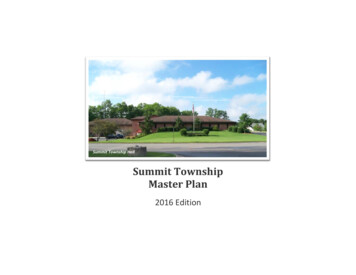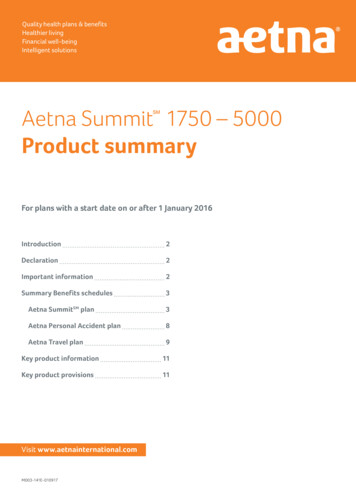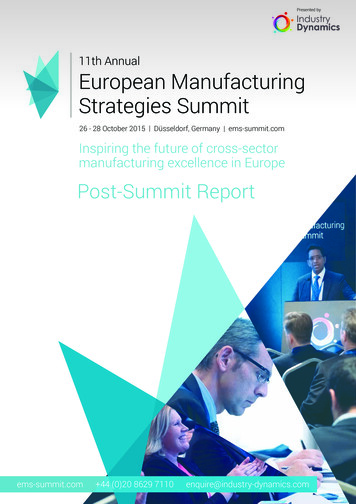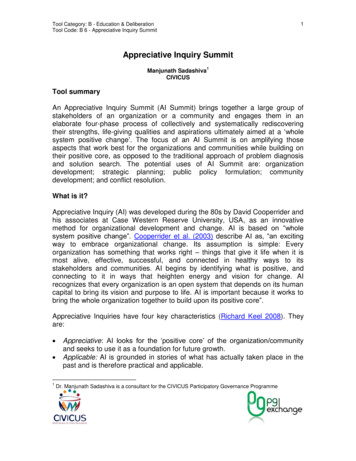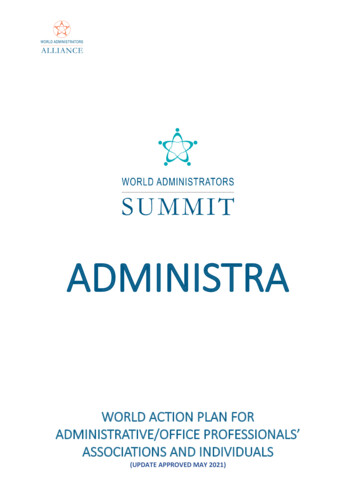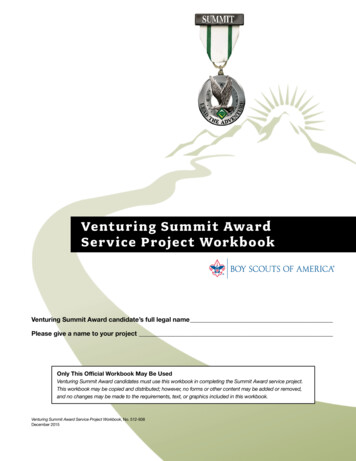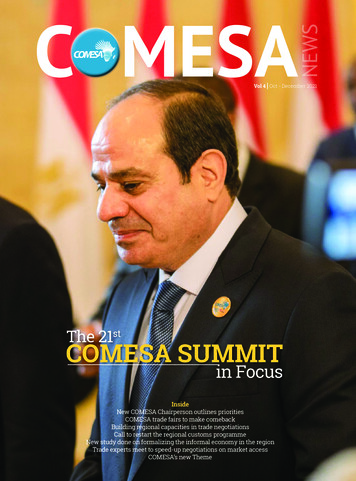
Transcription
NEWSVol 4 Oct - December 2021The 21stCOMESA SUMMITin FocusInsideNew COMESA Chairperson outlines prioritiesCOMESA trade fairs to make comebackBuilding regional capacities in trade negotiationsCall to restart the regional customs programmeNew study done on formalizing the informal economy in the regionTrade experts meet to speed-up negotiations on market accessCOMESA’s new Theme1COMESA Newsletter Vol. 3/21
2EditorialTime to align instruments ofgovernance with the new realityFinally, the 21st COMESA Summit has come to pass.This is one Summit that experienced unprecedentedchallenges. First was a sudden change of governmentin Sudan, which was the prospective host in 2019, to theCOVID-19 pandemic in 2020. The two developmentsdelayed the Summit for two years. To host the Summitin 2021, amidst a ranging pandemic, it took the resolve of the EgyptianGovernment and COMESA Secretariat to ensure it happened. SupportedCONTENTS1COMESA Summit Conducted in November3New COMESA Chairperson outlines priorities5Leaders urge for upscaling investments in health7COMESA annual report 2020 is launched10Trade experts meet to speed-up negotiations on11COMESA conducts study on formalizing the1315Building regional capacities in trade negotiations17Civil society trained on conflict early warning20Zambia launches structural vulnerability23New study identifies gaps in youth engagement27COMFWB, D R Congo trains27100,000 Euros worth of equipment to facilitate31COMESA at the Dubai Expoby technology, the event was a first; a hybrid, with the host President asincoming chair of COMESA, alongside the outgoing chair and Presidentof Madagascar, conducting the Summit physically in Cairo. Going by thenumber of Heads of State that attended virtually and some physically, itwas one of the most successful in recent times. But one thing has cometo the fore; that regional integration activities cannot stop as there willalways be solutions around challenges that emerge from to time. Thatis why the instruments that underpin governance and implementationof regional integration ought to be aligned with the new order that thepandemic has thrust upon us. The drafters of the COMESA Treaty, forexample never envisaged a situation where policy organs, more so theSummit, would meet virtually. But that is now the reality. Physical meetingshave had to give room to the virtual and the hybrid. It is time therefore toconsider revisiting the supreme instruments of governance to align themaccordingly with the new reality.COMESA INSTITUTIONSCOMESA Clearing HouseCOMESA Monetary InstituteTrade and Development BankAfrican Trade Insurance AgencyCOMESA Competition CommissionPTA Reinsurance CompanyCOMESA Regional Investment AgencyAfrica Leather and Leather Products InstituteCOMESA Federation of Women in BusinessSpecialized AgenciesAlliance for Commodity Trade in Eastern and Southern AfricaCOMESA Business CouncilRegional Association of Energy Regulators in Eastern and SouthernAfricaEast African Power PoolJudicial ArmCOMESA Court of Justicemarket accessinformal economy in the regionCOMESA Member States validates regionalresilience frameworktoolsassessment and resilience strategyin democratic governancebusiness mentorsborder trade fish trade commissioned in ZambiaEDITORIAL TEAMEDITOR:Mwangi GakungaCONTRIBUTORS:Mwangi GakungaMuzinge Nampito-ChibombaDaniel BandaARTWORK/LAYOUT:Philip Sipho KambafwilePHOTOGRAPHYPhilip Sipho KambafwileDaniel Banda,Mwangi GakungaMuzinge Nampito-ChibombaDisclaimerThe COMESA News is published by the Corporate Communications Unit of the Common Market for Eastern and SouthernAfrica – COMESA. Articles and photos in this publication may be freely reproduced but with acknowledgement of thesource. The views expressed in this publication do not necessarily reflect the policy of COMESA.
SUMMIT NEWSCOMESA Summit Conducted in NovemberNew theme developed to deepen business integration and economic recoveryThe 21st COMESA Heads of Statethe COMESA regional integrationrecommendations presented by theand Government Summit was heldagenda using digital platforms given theIntergovernmental Committee (IC) onuncertain nature of shocks.the way forward in implementation ofon 23 November 2021. The Summit washosted by the Government of Egypt andCOMESA integration programmes. Thecame three years since the last one heldAt the Summit, the President of Egypt,IC meet on 2 – 4 November 2021. Bothin Lusaka, Zambia in July 2018.H.E Abdel Fattah El-Sisi, took over themeetings were virtual.Consequently, a new Summit theme waschair of the COMESA Heads of Statedeveloped to rally Member States onand Government (also known as theThe IC comprises of Permanent/the focus area in the implementation ofAuthority) from H.E Andry Rajoelina,Principal Secretaries responsible for theregional integration programmes.President of Madagascar.development of programmes and actionplans in all fields of co-operation exceptThe theme: “Building Resilience Through The 21st Summit was conductedStrategic Digital Economic Integration,”in both physical and virtual formatsin the finance and monetary sector. Itwas motivated by the emergingand was preceded by two policyby various sectoral committees andregional and global economic and tradeorgans meetings: the 42 Meeting ofCOMESA institutions and madedynamics which have impacted heavilythe Council of Ministers and the 42recommendations to the Council ofon the COMESA regional integrationIntergovernmental Committee.Ministers for decision-making.reviewed progress reports presentedagenda, such as the COVID-19Pandemic. The Summit rallied MemberThe Council met on 9 – 10 NovemberStates on how to safeguard and advance 2021 to make decisions on various1COMESA Newsletter Vol. 3/21
SUMMIT NEWS2Recordattendanceat the21st SummitThe 21st COMESA was attended(Somalia) and Pres. Kais Saied (Tunisia).by nine Heads of State andHeads of State. They were Mr SaulosChilima, (Malawi) Madam JessicaGovernments, the highest in recentIn the previous Summits, three headsAlupo (Uganda) and Madam Mutaletimes. They included the host Presidentof State attended the 20th and 19thNalumango of Zambia. The DR CongoAbdel Fattah El Sisi, Pres. EvaristeSummits (2018 and 2016) and sevenPresident, who is the Chair of the AfricanNdayishimiye, (Burundi), Pres. Andryeach at the 18th and 17th SummitsUnion, was represented by Amb. DidierRajoelina (Madagascar) Pres. Mohamedin 2015 and 2014 respectively. TheseMazenga Mukanzu, Minister of RegionalYounes al-Menfi, (Libyan PresidentialSummits were, however, fully physical.Cooperation while the President ofCouncil), Prime Minister PravindKenya, who is the chairperson of the EastJugnauth (Mauritius), Pres. Paul KagameAt the Summit in Egypt, three Vice-African Community was represented by(Rwanda), Pres. Wavel RamkalawanPresidents attended and presentedTreasury Cabinet Secretary, Amb. Ukur(Seychelles), Pres. Mohamed Abdullahistatement on behalf of their respectiveYatani.
SUMMIT NEWSNew COMESA Chairperson outlines prioritiesPresident Abdel Fattah El Sisi (R) meets COMESA Secretary General, Chileshe Mpundu Kapwepwe at the Summit in CairoEgypt took over the Chair of COMESAfrom Madagascar, which had beensteering the organization since 2016.President Abdel Fattah El Sisi tookover from President Andry Rajoelina ofMadagascar during the 21st Summit ofthe COMESA Authority of Heads of Stateand Governments on 23rd November inCairo, Egypt.Heads of State and their representativesattended the Summit physically andvirtually. Soon after, President El-Sisioutlined his areas of focus during histenure as the Chair of COMESA, whichare also aligned with the COMESAMedium Term Strategic Plan for 2021– 2025. The MTSP was launched at theSummit.His focus, he said will be on achievingregional economic integration byworking towards elimination of barriersto regional trade and promotingEgypt firmly believes inthe importance of regionaland continental integrationand constantly seeks todevelop intra-trade within thisintegration,” President El-Sisiindustrialization to increase productivityin the region.“Egypt firmly believes in the importanceof regional and continental integrationand constantly seeks to developintra-trade within this integration,” thePresident said.He also identified infrastructuredevelopment particularly transport,energy, information, communicationtechnology as his priority. Moreover,encouraging the flow of investments inthe region, promoting regional integrationin the health sector would also be top onhis agenda.During his tenure, he will also focuson creating a conducive businessenvironment, particularly initiativestargeting digital transformation andfinancial inclusion to serve small- andmedium-sized companies.President El Sisi commended hispredecessor, President Rajoelina, forthe concrete achievements realized tostrengthen regional economic integration.President Rajoelina was chairpersonof COMESA for three years, out of thecumulative five years that Madagascarwas at the helm of the regional bloc.In his address, President Rajoelina saidContinued to page 43COMESA Newsletter Vol. 3/21
4Continued from page 3digital transformation has been a keyplank in his tenure. Specifically, he saiddigital trade had proven critical duringthe COVID-19 pandemic and thankedthe COMESA Secretariat for coming upwith digital solutions, such as onlineplatforms, to facilitate trade.Nonetheless, he said the major challengeto regional integration remains funding.“If we really want COMESA to become aneffective tool of development, we have tothink of better alternatives of financingopportunities,” he said.The 2021 Summit themed “BuildingResilience Through Strategic DigitalEconomic Integration” was held threeyears after the last was hosted by theCOMESA Secretariat in Lusaka, Zambia,on 18 - 19 July 2018. Egypt last hostedthe COMESA Summit in 2001.Heads of State who participated andaddressed the Summit were; PresidentEvariste Ndayishimiye, (Burundi),Pres. Kais Saied (Tunisia), Pres.Mohamed Younes al-Menfi, (LibyanPresidential Council), Prime MinisterPravind Jugnauth (Mauritius), Pres.Wavel Ramkalawan (Seychelles), Pres.Mohamed Abdullahi (Somalia) and Pres.Paul Kagame (Rwanda). Three VicePresidents; Malawi, Uganda and Zambiaand two ministers from Kenya and D RCongo represented their Heads of Stateand addressed the Summit.The leaders called for adoption ofdigital technologies, harmonization andadoption of policies that promote thecreation of such systems in varioussectors. They further, stressed the needto develop green economies in theregion to cushion the impact of climatechange. They commended the COMESASecretariat for implementing innovativesystems such as the digital onlineplatform to facilitate trade amid theCOVID-19 pandemic.In her address to the Summit, SecretaryGeneral Chileshe Kapwepwe said that,owing to the COVID-19, the COMESAregion’s average growth had slowed to0.6% in 2020 down from 5.2% in 2019and 6.0% in 2018.“It is my hope that renewed commitmentwill address the challenges faced byCOMESA, which include amongst others,slow ratification and domesticationof legal instruments, delayedimplementation of the Decisions by theAuthority and the Council of Ministers,”she said.Other leaders that spoke at the Summitwere the Chairperson of the AfricanUnion Commission, Moussa FakiMahamat, the World Bank Director forRegional Integration, Africa, Middle Eastand North Africa Regions, Ms. BoutheinaGuermazi, and the African DevelopmentBank President, Dr Akinwumi Adesina.“If we really wantCOMESA to becomean effective tool ofdevelopment, wehave to think of betteralternatives of financingopportunities,” President AndryRajoelina.
SUMMIT NEWSFresh call to ratify theCOMESA-EAC-SADCtripartite agreementIn November 2021, COMESA Heads ofState made a fresh call to Member Statesthat are yet to ratify the tripartite Free TradeAgreement to do so to enable it to enterinto force. So far, the agreement requiredthree ratifications to attain the 14 thresholdfor its implementation.The leaders recalled that the tripartiteCOMESA-EAC-SADC Tripartite Free TradeArea (TFTA) Agreement was launched sixyears ago, in June 2015 in Sharm-El-Sheikh,Egypt.CLeaders urge for upscalinginvestments in healthOMESA Heads of State urged MemberStates to scale up investment inresearch and innovation in the healthsector and to prioritize all programmes thatwould enhance socio-economic recoveryand generate more resilient societies thatare ready to respond to disasters that maycome.In their Communique issued at the end oftheir 21st COMESA Summit, the leadersnoted the devastating socio-economic andcultural effects of the COVID-19 pandemicacross various sectors of the economy andthe low vaccine production and access inthe region.They urged Member States to investin digital infrastructure to enhanceuniversal access to internet to addressthe challenges arising from the digitaldivide and support the digitalization of theeconomies.pandemic and way forward, is in linewith the theme of the COMESA Summit:Building Resilience Through StrategicDigital Economic Integration, whichadvocates for the application of ICTsolutions in driving regional integrationforward.They commended Egypt, Rwanda, Ugandaand other Member States that are takinginitiatives for vaccine production and calledfor the fair global distribution of vaccinesparticularly for Africa.Further, the Heads of State endorsedthe establishment of a Multi–SectoralTechnical Committee on health mattersto coordinate and support regionalprogrammes on health-related mattersat the COMESA Secretariat. This is in linewith Article 110 of the COMESA Treaty onCooperation of Member States on HealthMatters.They recognized the importance of theTripartite Agreement in resolving thechallenges of multiple memberships inthe three RECs and of championing andexpediting continental integration process.They noted that 11 Tripartite Member/Partner States have submitted instrumentsof ratification including Botswana, Burundi,Egypt, Eswatini, Kenya, Namibia, Rwanda,South Africa, Uganda, Zambia andZimbabwe.The objective of the COMESA-EAC-SADCTripartite group is to strengthen economicintegration of the southern and easternAfrica region through joint planning,design, coordination, and implementationof policies and programmes across thethree blocs. The focus areas are trade,customs and infrastructure development,and industrialization. The Tripartitealso provides a platform to address theoverlapping memberships of countries tothe three RECs.Early in 2021, Ministers from the tripartitegroup set June 2021 as the deadline toachieve the threshold of 14 ratifications.This was missed, hence the fresh call bythe Heads of State was seen as a welcomeintervention.The focus on the impact of the COVID-195COMESA Newsletter Vol. 3/21
New judge, commissioners sworn in6Justice Salohy Norotiana Rakotondrajery RandrianarisoaJFile photo/ COMESA booth at the Ndola Trade Fair in ZambiaCOMESA trade fairs to makecomebackThe 21st Summit endorsed the revival ofthe COMESA Trade Fairs to exploit thetrade potential of the region. At the same,it re-emphasized the important roleplayed by the private sector in enhancingregional integration.The objective of the trade fairs is toprovide opportunities for businesses inthe COMESA region to showcase theirproducts and services and demonstratetheir potential, to facilitate businesslinkages, partnership and joint ventures.The initiative by the COMESA BusinessCouncil, was earlier in October, presentedand adopted by the COMESA Council ofMinisters as a mean of promoting intratrade within the COMESA region, throughtrade and investment.The trade fairs will be structured intwo major activities: exhibition andconference. Participating Member Statesand corporates will set up pavilions andexhibition booths to showcase theirgoods and services.The proposed conference dubbed“COMESA Taste for Africa Conference”will run alongside the expo andwill address topical issues relatingto trade finance, payments, tradefacilitation, trade-enabling infrastructure,harmonisation of trade standards andregional value chains.At the Council meeting conducted on9th November 2021, Egypt indicated itwould explore the possibility of hostingthe first Intra-COMESA Trade Fair duringthe first half of 2022. Hence, the Councildecided that COMESA Secretariat andCBC in collaboration with Member Statesmobilize resources to organize the tradefair which will be held every two years.With the endorsement of the Heads ofState, the resumption of the trade expois expected to make a comeback aftermore than a decade.ustice Salohy Norotiana RakotondrajeryRandrianarisoa of Madagascar wassworn-in as one of the five judges of theAppellate Division of the COMESA Courtduring the Heads of State Summit in Cairo,Egypt. Justice Randrianarisoa, a SeniorJudge and Director General of JudicialAffairs, Research and Reforms at theMinistry of Justice in Madagascar replacedthe late Justice Abdalla El Bashir fromSudan, who passed on in February 2020.She was virtually sworn in during the 21stCOMESA Heads of State and Governmentheld on Tuesday 23rd November 2021.Four new Commissioners for the COMESACompetition Commission were alsosworn-in to serve for a period of four years.They were Mr. Mahmoud Momtaz fromEgypt, Mr. Mesganu Arga Moach (Ethiopia)Mr. Lloyds Vincent Nkhoma (Malawi) andMs. Beatrice Uwumukiza (Rwanda). TheCommissioners were appointed by the41st COMESA Council of Ministers Meetingheld on 26 November 2020 for a three-yearperiod from 15 - July 2021 to 14 July 2024.Others sworn-in were three members ofthe COMESA Committee of Elders. Theywere Mrs. Hasna Barkat Daoud fromDjibouti, Ambassador Mohamed AshrafGamal Rashed from Egypt and MmeMonique Andreas Esoavelomandroso ofMadagascar.The Committee of Elders was establishedby the COMESA Heads of State in 2006to complement peace-making andpeace-building capacity of the Office ofCOMESA Secretary General under theCOMESA Governance Peace and SecurityProgramme. Among its key activities isleading the COMESA Elections ObservationMissions in Member States.
SUMMIT NEWSPresident Andry Rajoelina (R) hands over the COMESA Annual Report - 2020 to President Abdel Fattah El SisiCOMESA annual report 2020 is launchedOutgoing chairperson of COMESA,President Andry Rajoelina launchedthe 2020 COMESA Annual Report whichhe handed over to his successor PresidentAbdel Fattah El Sisi. The report outlinedthe achievements during the past year,which was characterized by the COVID-19Pandemic and its aftermath.During the period, COMESA regionrecorded a negative macroeconomicgrowth shrinking by negative 5.4percentage points to 0.2%, from 5.6%in 2019. Resultant COVID-19 responsemeasures that included lockdowns, travelrestrictions, border closures, constrainedexternal financing following capitaloutflows and sharp declines in capitalinflows and remittance are some of thefactors that affected growth.In addition, the impact of multiple shocks,particularly the effects of floods, locustinvasion and collapse of commodity priceshave also contributed to the negativegrowth.However, the International Monetary Fund(IMF) in April 2021 projections showed thatthe COMESA region average growth wouldrebound to 4.3% in 2021 and further to6.0% in 2022.This recovery in growth forecast in theregion is being anchored on several factorsincluding optimism about a recovery inadvanced economies, driven in large partby scale up of vaccination efforts againstCOVID-19, and the extraordinary levelof policy support - fiscal stimulus andcontinued accommodation by centralbanks.The recovery in commodity prices andfirm worldwide demand particularly inChina and broadly accommodative globalfinancial conditions, given low globalinterest rates and spreads are expected toboost the economies.The report indicated that the immediatechallenge for most countries in the regionis stopping the COVID-19 pandemic andsaving lives by among others, qualityspending to strengthen local healthsystems and containment efforts andenhancing the roll out and uptake of theCOVID-19 vaccine.Other interventions, include measures tosupport speedy recovery of economies,reign on the threatening debt levelsand in the medium term, ensurestructural transformation and economicdiversification of individual economies.Leveraging on African Continental FreeTrade Area (AfCFTA) to strengthen valueaddition and industrial growth and toincrease the role of digitization, will beimportant steps in the right direction.7COMESA Newsletter Vol. 3/21
SUMMIT NEWS8Common Market forEastern and Southern AfricaTSummit adoptsmeasures toenhance youthinvolvementhe Summit endorsed theestablishment of the COMESAYouth Advisory Panel to fosterengagement of the youth in policydialogue. The Panel would be aconsultative regional body on youthrelated matters, which have themandate to bridge the gap between theyoung people and the decision-makersat both regional and Member Stateslevels.Members of the panel will contributeto the decision-making processes inthe region on youth participation indemocratic governance and socioeconomic development processes.The panel is one of the forums andinstruments developed to harness thepotential for young people to strengthenand grow the continent’s economies.The initiative is part of the activitiesunder the COMESA gender and socialaffairs programme.The Summit also endorsed the COMESAGender Policy Implementation Planto strengthen gender mainstreamingat all levels. It commended Eswatini,Madagascar, Malawi, Mauritius andSeychelles on the signing of the SocialCharter and urged Member States thathave not yet signed to do so.MEDIUM TERMSTRATEGIC PLAN 2021-20251COMESA’s five-yearblueprint launchedThe COMESA Medium-Term StrategicPlan 2021- 2025 (MTSP) waslaunched at the 21st COMESA Summitin Cairo.The new strategy recognizes thesocio-economic adverse impacts ofthe COVID-19 pandemic on COMESA’sintegration agenda and incorporatespolicy interventions required aseconomies enter the successive phasesof crisis-response, recovery and buildingof resilience.The plan has four strategic pillars:market integration; physical integration/connectivity; productive integrationand gender and social integration. Itwill serve as a useful tool to engageCOMESA’s strategic partners in thepursuit of regional integration andprovide a framework by which detailedannual work programmes and budgetswill be developed.
SUMMIT NEWSLeaders welcome the restoration of civilian rule in SudanCOMESA Heads of State welcomedthe Agreement of November21, 2021, to reinstate Prime MinisterAbdalla Hamdok to office and therestoration of civilian rule in Sudan. Intheir communique issued at the closingof their 21st Summit in Cairo, the leadersurged that every effort be made to leadSudan towards close adherence to thetimelines of the Transition.The leaders reiterated the importance ofpeace, security and stability for creatingan enabling environment for investment,sustained economic development anda viable integration for the region. Theyencouraged the political leaders in Sudanto expedite the creation of a unifiedarmy as well as the drafting of a newconstitution that will, among other things,outline the partnership between civilianand military in the transition government.The Summit welcomed the otherelements of the November 2021Agreement on Sudan including therestoration of the Council of Ministersand the release of political detaineesOn Libya, the leaders lauded thesigning of the October 2020 CeasefireAgreement and commended thestakeholders on their commitment tothe attainment of lasting peace in thecountry. They welcomed the roadmapdeveloped by the Libya Political DialogueForum towards free, fair, and inclusivepresidential election on 24th December2021 and called on all the parties toredouble their efforts to ensure that theelections are held on schedule.Agreement and to fully comply with theArms Embargo; and reiterated its call forthe withdrawal of all foreign forces andmercenaries from all Libyan territory, land,sea, and air, without delay.They noted that the problem of illegalimmigration places a lot of pressure onLibya as a transit state and emphasizedthat the problem requires a politicalsolution for its resolution.They called on the European Union andCOMESA Member States to supportsocial economic programmes particularlyfor the youth.The Heads of State called on allMember States to respect the Ceasefire9COMESA Newsletter Vol. 3/21
10Trade experts meet to speed-up negotiations on market accessTrade experts from Member Statesconcluded a three-day virtual meeting,Thursday 30 September 2021, whichreviewed progress on the liberalizationof trade in services for enhancedmarket access under the COMESA FreeTrade Area.The meeting was the 10th for theCOMESA Trade in Services Committee.It received updates from MemberStates on the progress they have madein their bilateral negotiations and tariffoffers.Further, discussions were conducted tofinalise the negotiations on the prioritysectors; communication, financial,tourism and transport services, andproceed to the implementation of thecommitments made by countries.COMESA has prioritized and negotiatedschedules of specific commitments inthe four priority sectors.The proposals emerging from theCommittee’s meeting will be tabledbefore the upcoming Trade Policy OrganMeetings when the final and legallyscrubbed schedules will be submittedfor approval and adoption by theCouncil of Ministers.The Committee of Trade in Servicesleads in the negotiations as mandatedby the Council to spearhead theCOMESA trade in services liberalisationprogramme. The Council adoptedthe COMESA Regulations on Tradein Services in 2009 and initiatednegotiations on the progressivereciprocal removal of related barriers inseven priority sectors, focusing on onlyone major area of services negotiations;market access.“The basis or general assumption atthe time - and most Member Statesaccepted that assumption - was thatthe most important and essentialoutcome for any trade in servicesnegotiations was market access,” DrKipyego Cheluget, Assistant SecretaryGeneral of COMESA told the delegates.The assumption and expectation ofthe Council was that the COMESAprogramme on progressive liberalizationof trade in services, would be completeand operational so that the COMESAFree Trade Area covers both trade ingoods and services as envisaged in theTreaty.“Unfortunately, that has not been thecase and the negotiations for marketaccess under the schedules of specificcommitments is still incomplete,” DrCheluget noted. “The lack of progress
affects the implementation of theadopted commitments in 2014 andfinalising negotiations on the remainingadditional priority sectors.”The liberalisation of services in membercountries is expected to unlock manyopportunities for all COMESA servicesuppliers. For example, many of thelesser developed COMESA countries,have a distinct shortage of quality andefficiently priced services to underpin allother economic activity.It is also expected to lead to deeperintegration, support regional markets,promote healthy competition of qualityservices, enhance COMESA’s servicessector and its access to other marketsoutside COMESA and create the basisfor wider markets under the AfCFTA andthe Tripartite Free Trade Agreements forthe future.Dr Cheluget implored the Committeeto set timeframe for the completionof the process of negotiations so thatMember States can start to implementthe commitments made.“Let us commit to finalise this processby mid-year, June 2022” he urged thedelegates.The basis or generalassumption at the time - andmost Member States acceptedthat assumption - was that themost important and essentialoutcome for any trade inservices negotiations wasmarket access,” Dr Kipyego Cheluget,Small Scale traders at Kasumbalesa border between Zambia/DDR CongoCOMESA conducts study on formalizing theinformal economy in the regionCOMESA has conducted a study,which reviewed Member Statespolicies related to the formalisationof the informal economy, focusingon informal trade. It focused on thedrivers of informality, the impacts ofinformality on the economy, includingon government revenue and onproductivity. It also identified the policiesthat Member States have instituted toaddress informality.The study is part of the implementationof the Small-Scale Cross Border TradeInitiative (SSCBTI) funded under the11th European Development Fund (11thEDF). This project is intended to increaseformal small-scale cross-border tradeflows in the COMESA/tripartite region,leading to higher revenue collection forgovernments at the borders as well asincreased security and higher incomesfor small-scale cross-border traders.The study report was presented toMember States for validation in avirtual meeting on 7 October 2021. Itwas attended by senior governmentrepresentatives from the ministriesresponsible for trade, finance, gender,small and medium enterprises as wellas immigration, customs and otherrelevant border level representativesfrom the countries covered by the SSCBTproject: D R Congo, Ethiopia, Kenya,Malawi, Zambia, and Zimbabwe.According to the study conducted bya consultant, Dr Evarist Mugisa, allthe seven Member States, includingTanzania, have a sizeable informaleconomy, serving as a source oflivelihoods. However, the size of theinformal economy was not clear dueto the lack of reliable data. Estimatessuggest it exceeds the official economicactivity.“An important component of theinformal economies of these countriesis Informal Cross-Border Trade (ICBT),which involves small scale traders whocarry goods across borders evadingall regulatory requirements,” Dr Mugisaobserved. “The immediate impact of thisis that governments do not receive thetax revenues on these transactions. ICBTalso distorts the trade policy in thesecountries.”The proliferation of informality in thesecountries is driven by a wide range offactors, including poverty, a restrictiveContinued to page 1511COMESA Newsletter Vol. 3/21 pag
of regional and continental integration and constantly seeks to develop intra-trade within this integration," the President said. He also identified infrastructure development particularly transport, energy, information, communication New COMESA Chairperson outlines priorities technology as his priority. Moreover,



